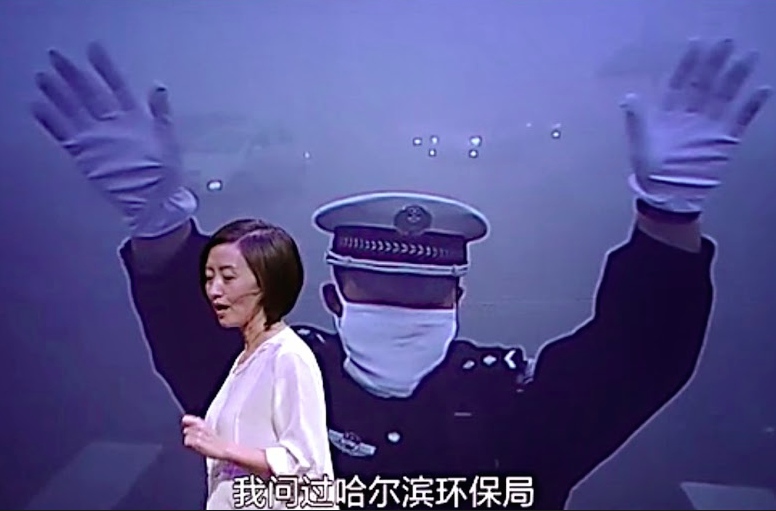
Polarized public discourses over Chai Jing's documentary make it impossible to build consensus on China's air pollution problem.
“Under the Dome”, the sensational documentary on the air pollution crisis in China produced by former state media CCTV reporter Chai Jing, was taken down from major Chinese video websites on March 6, just one day after the opening of the annual session of the National People’s Congress.
Before the takedown, it had already drawn more than 200 million views and stirred intense debate among the Chinese public.
The documentary was well received. Many compared it to Al Gore’s “An Inconvenient Truth” (2006) and Rachel Carson’s “Silent Spring” (1962) and praised Chai Jing’s initiative and persistence. The full English translation of the video is now available:
Yet, within more politicized circles of online opinion leaders, there has also been a myriad of criticism. Some peeped into Chai Jing’s private life, accused her of hypocrisy – smoking and driving, giving birth to her daughter in the US – while some questioned her motive for making the documentary, suspicious of her funding resources. And others criticized her investigative report as unprofessional and full of data flaws.
Though the public dialogue triggered by the documentary is unprecedented in China, whether or not the conversation will lead to a public consensus in today's China remains an open question. He Qinglian, a well-known Chinese economist and author, believed such consensus is no longer possible due to the extreme inequality with which social benefits are allocated in China.
Zhao Yifang, a student at London School of Economics, found the skepticism in public discourse frustrating:
这种非黑即白的思维说明一个现象就是,我们总在忽略人性的复杂。一个个体,做一件事情的动机难道
往往是多元的吗?一个公众人物决定做一件事情的时候,很可能是因为他或她的理想因素,虚荣心因素,利益考量等等综合在一起的结果。那有如何?为何公众不能坦诚面对人性的多元而要去计较一个绝对的伟大或者卑鄙?
The black-and-white mindset ignores the complexity of human beings. Why can’t we be tolerant of it? Does it matter if the public figure has various motives, including their ideals, desire to be famous, and their benefits? Why not accept the complexity of human beings instead of getting bogged down in expecting the absolute great or petty?
Famous Twitter-like Sina Weibo critic “Pretending in New York” (@假装在纽约) was also fed up with all the conspiracy theories about the documentary:
我甚至不在乎柴静拍这部视频是不是有炒作自己或者捞钱的目的。我不在乎。我对这个问题完全不感兴趣。这完全不重要。 柴静做了这么一次调查,形成了全社会呼吁解决雾霾问题的压力。这本身已经是一件功德无量的事。我心存感激。我甚至希望她能够从中因此获利,因为这样会激励更多的人走上她这条路。
I really don't care whether Chai Jing wants to make herself famous or to earn money from the documentary. I only appreciate her for her work which has pressed society to think about an air pollution solution. I even hope that she will benefit from the documentary, which would encourage more people to take up the cause.
Others pointed out that the controversy and questioning might be a necessary step in the Chinese public learning how to debate and discuss publicly. Murong Xuecun (慕容雪村), a writer in China, wrote on China Digital Times:
在公共事务的讨论中,诉诸情感或诉诸道德,常常是理据匮乏、语言匮乏的表现。但以宽容的心态视之,也可以把这当成是中国人学习如何参与讨论的必经阶段。而这才是真正应该“从我做起”的事,其中包括:尊重自己的论敌,尽量使用数据和事实说话,尽量不使用过激的语言,等等。
In public discussion, distorting with either emotional anecdotes or moral virtues could be regarded as a lack of supportive evidence or persuasive language. But we should also be tolerant, since it’s a necessary stage for Chinese to get to know how to be involved in public discussion, including how to respect the opposite sides, use data and facts, avoid aggressive language, etc.
Moreover, Murong also noticed that the black-and-white mindset may be an outcome of the ongoing repression of online speech in China:
很少有人注意到当前的分歧与言论环境的关系。在过去的两年间,中国的言论空间空前压缩,大量的账号被注销,许多原本可以存在的NGO被强令注销,大量的人被捕入狱。在日益艰难的环境中,言论者群体和社会公众都开始了明显的分化,一部分人投向主旋律的怀抱,一部分人闭上了嘴,还有一部分人则开始抛弃温情话语,走向激烈甚至极端.
During the past two years, the public discussion space has been greatly shrinking, many public figures’ social media accounts were closed, and NGOs were shut down. Under such circumstances, both public figures and netizens began to adopt extreme ways, some of them embraced the mainstream themes, some closed their mouths, and others moved away from the mild words toward aggressive or even extreme behaviors.
Murong concluded that Chai Jing, who is a typical figure of moderate groups that mildly criticize social problems and don't stand with either side of a debate, is doomed to be attacked fiercely, and the trend is here to stay.
Zhang Tiezhi, a Taiwanese writer echoed Murong on the dwindling public discussion space in China. He stated that compared with air pollution, politic pollution is more severe. He rightly pointed out that without a vigilant civil society, the documentary will at best serve as a wake-up call for some individuals to tackle with pollution, instead of provoke any fundamental changes in the system.






